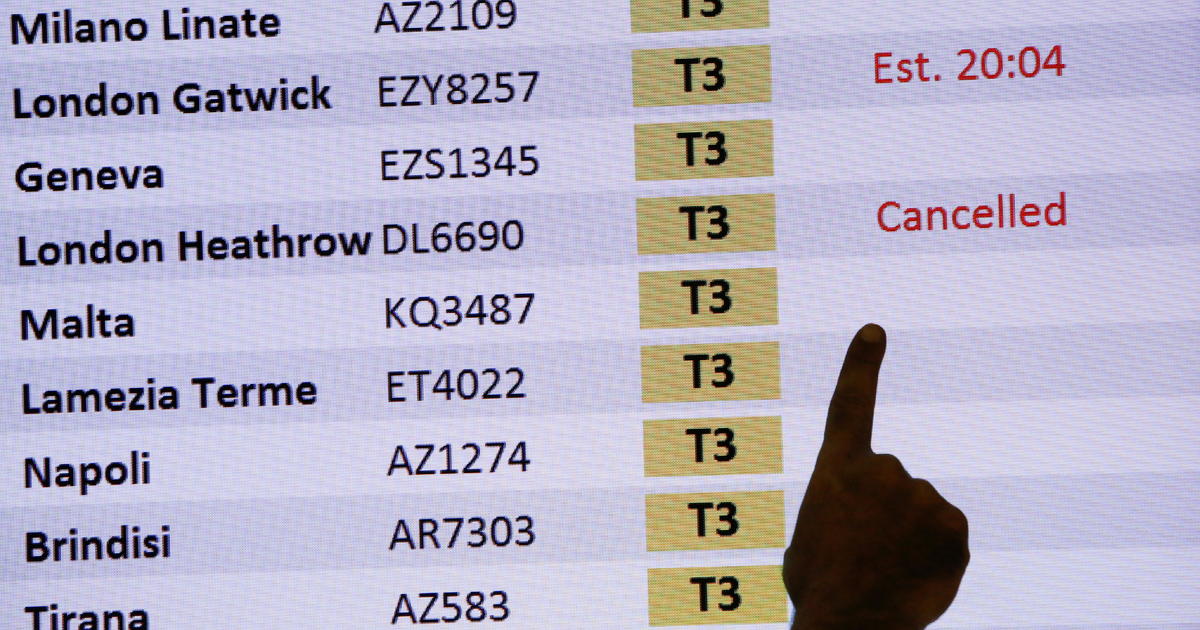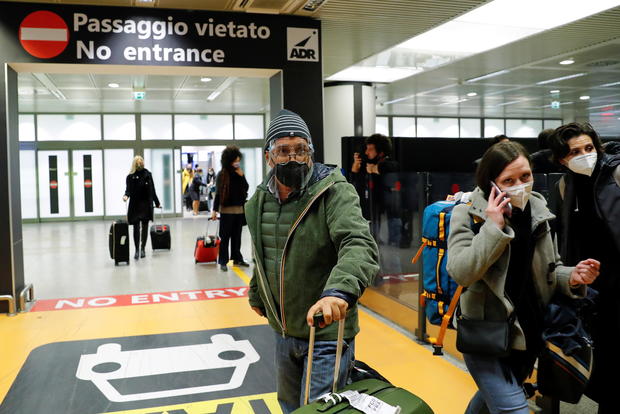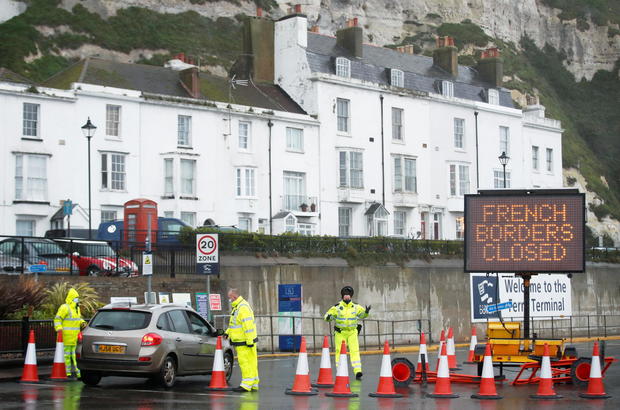
A growing number of European Union countries, Canada and other countries banned travel from the UK on Sunday and others studied similar actions in an attempt to block a new strain of coronavirus that has been sweeping the south of England. France, Germany, Italy, the Netherlands, Denmark, Poland, Belgium, Austria, Ireland, Norway, Bulgaria, Canada, Israel and Hong Kong announced travel restrictions in the UK after British Prime Minister Boris Johnson said the purchases and Christmas meetings in the south of England will be canceled due to the rapid spread of culprit infections of the new variant of the coronavirus.
Johnson immediately placed these regions under a strict new level 4 restriction, increasing Christmas plans by millions.
France banned all travel from the UK for 48 hours from midnight on Sunday, including trucks carrying goods through the tunnel under the English Channel or from the port of Dover on the south coast of England. French officials said the break would gain time to find a “common doctrine” on how to deal with the threat, but threw into chaos the busy multichannel route that thousands of trucks use every day.
The port of Dover tweeted on Sunday night that its ferry terminal was “closed to all accompanied traffic leaving the UK until further notice due to border restrictions in France”.
Eurostar passenger trains from London to Paris, Brussels and Amsterdam also stopped.
Germany said all flights from Britain except cargo could no longer land from midnight on Sunday. He did not immediately say how long the flight ban would last.
REMO CASILLI / REUTERS
Denmark suspended flights from Britain to Denmark for 48 hours as of Monday, according to Reuters news service.
Belgian Prime Minister Alexander De Croo said he was issuing a 24-hour flight ban from midnight “as a precaution”. He said there are “many questions about this new mutation,” adding that he hopes to have more clarity on Tuesday.
Canada announced its own ban Sunday night. Prime Minister Justin Trudeau said in a statement that for 72 hours from midnight on Sunday, “entry to Canada will be banned on all flights from the UK”. He added that travelers arriving on Sunday would be subject to secondary tests and other health measures. A government follow-up statement said cargo flights were not included in the ban.
Hong Kong has banned flights from Britain because of the new strain of virus, Agence France-Presse reported.
The Central American nation of El Salvador, meanwhile, said it would deny entry to anyone who has visited Britain in the previous 30 days.
New York Gov. Andrew Cuomo wants to ban flights from Britain to New York over fears of the new coronavirus strain.
Cuomo told reporters at a teleconference on Sunday that the six flights arriving daily at Kennedy Airport from Britain pose a health risk. He asked the federal government to ban flights or require evidence from all passengers.
The first wave of coronavirus infections in New York “came from Europe and we did nothing,” the Democratic governor said. “Doing nothing is negligent.”
President-elect Joe Biden, the U.S. surgeon general, said Sunday that the emergence of the new strain does not change public health guidelines on precautions to reduce the spread of the virus, such as wearing masks, distancing socially and wash your hands.
“While it appears to be more easily transmitted, we still don’t have evidence that it is a more deadly virus for a person who acquires it,” Vivek Murthy told NBC News’ “Meet the Press.” “There is no reason to believe that the vaccines that have been developed are not effective against this virus as well.”
REMO CASILLI / REUTERS
The British government said Johnson would chair a meeting of the government’s crisis committee, COBRA, on Monday, following measures by other nations. They arrive at a time of huge economic uncertainty for the UK, less than two weeks before they leave the EU’s economic structures on 31 December and with talks on a new post-Brexit trade relationship still stalled.
Johnson said on Saturday that a new variant of the virus that moves quickly and is 70% more transmissible than existing strains appeared to be driving the rapid spread of new infections in London and southern England in recent weeks. But she stressed that “there is no evidence to indicate that she is more lethal or causes more serious illness,” or that vaccines will be less effective against her.
However, according to experts, it is inevitable that more cases will lead to more hospitalizations and subsequent deaths related to the virus.
On Sunday, British Health Secretary Matt Hancock added to the alarm when he said “the new variant is out of control”. The UK recorded 35,928 more confirmed cases, about twice as many as a week ago.
Italy has detected a patient infected with the new strain of the virus, the health ministry said Sunday night, according to The Telegraph. The patient and his partner had returned to Italy from the UK in recent days, the ministry said.
Germany, which holds the rotating EU presidency, convened a special meeting on Monday to coordinate the response to news about the virus among the bloc’s 27 member states.
The Netherlands banned flights from the UK at least the rest of the year. Ireland issued a 48-hour flight ban. Italy said it would block flights from the UK until January 6 and an order signed on Sunday bans entry to Italy by anyone who has been in the UK for the past 14 days.
The Czech Republic imposed stricter quarantine measures on people arriving from Britain.
Beyond Europe, Israel also said it banned flights from Britain, Denmark and South Africa because they were the countries where the mutation is found.
The World Health Organization tweeted late Saturday that it was “in close contact with UK officials about the new variant of the # COVID19 virus” and pledged to update governments and citizens as it more is known.
The new strain was identified in the south-east of England in September and has spread to the area since then, a WHO official told the BBC on Sunday. “What we understand is that it has increased transmissibility, in terms of its dissemination capacity,” said Maria Van Kerkhove, WHO Technical Officer on COVID-19.
MATTHEW CHILDS / REUTERS
Studies are being conducted to better understand how quickly it spreads and whether it “is related to the variant itself or to a combination of factors and behavior,” he added.
He said the strain had also been identified in Denmark, the Netherlands and Australia, where there was a case that did not spread further.
“The longer this virus spreads, the more opportunities it has to change,” he said. “So we really have to do everything we can right now to prevent the spread.”
Viruses mutate regularly and scientists have found thousands of different mutations among virus samples that cause COVID-19. Many of these changes do not affect the ease with which the virus spreads or the severity of symptoms.
The British health authorities said that although the variant has been circulating since September, it was not until the last week that officials considered they had enough evidence to declare that it has a higher transmissibility than other coronaviruses in circulation.
Patrick Vallance, the UK government’s chief scientific adviser, said officials were concerned about the new variant because it contained 23 different changes, “an unusually large number of variants” affecting the way the virus binds and enters the cells of the body.
Officials are not sure if it originated in the UK, Vallance added. But in December, he said, it was causing more than 60% of infections in London.
Europe has been surrounded this fall by rising new infections and deaths due to the resurgence of the virus, and many nations have re-imposed a number of restrictions to try to reign in their outbreaks.
Britain has recorded more than 67,000 deaths in the pandemic, the second highest number confirmed in Europe after Italy. Europe as a whole has reported nearly 499,000 deaths from viruses, according to a Johns Hopkins University count that experts believe is an insufficient number due to limited evidence and lost cases.
Meanwhile, the European Medicines Agency is meeting to approve the first COVID-19 vaccine for the 27 nations of the European Union, which brings vaccinations closer to millions of EU citizens. The vaccine manufactured by the German pharmaceutical company BioNTech i The American pharmacist Pfizer is already used in the United States, Great Britain, Canada and other countries.
The EMA advanced its evaluation of the Pfizer-BioNTech vaccine a week after strong pressure from EU governments, especially Germany, which said that after the EMA approval it could start vaccinating citizens already next Sunday.


